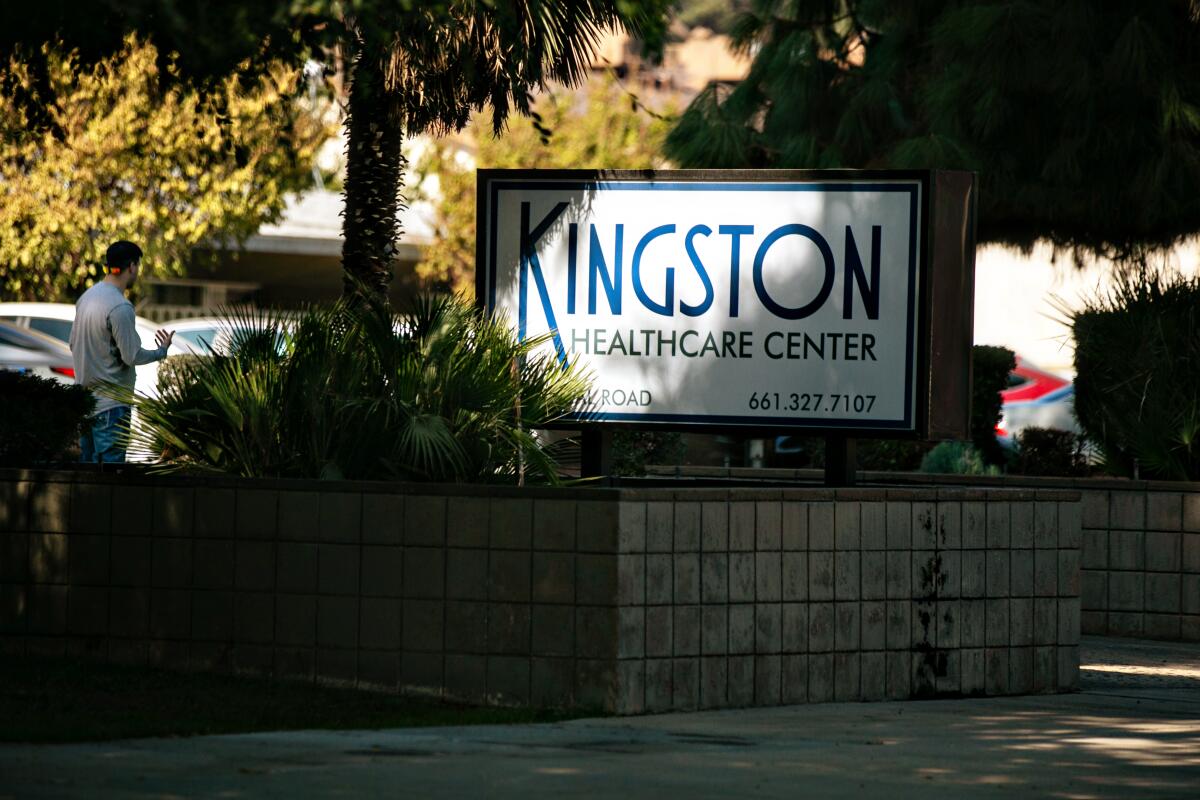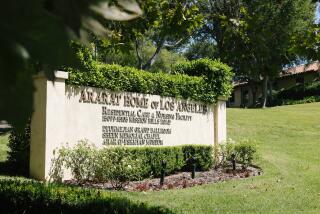Nursing home infamous for high number of COVID deaths to close

Kingston Healthcare Center in Bakersfield — a long-troubled nursing home that saw 19 residents die during an early COVID outbreak — announced it would close after the Department of Health and Health Services said the facility could no longer receive Medicare or Medicaid payments.
The department cited a long history of health code and other violations.
The Centers for Medicare and Medicaid Services office in San Francisco notified Kingston that its contract would be terminated Feb. 6 because it “failed to attain substantial compliance with multiple Medicare and Medicaid requirements,” including infection control, resident rights, quality of life, quality of care, food and nutrition, and dental and physician services.
Kingston’s administrators sent a letter to residents saying the nursing home would close, but they did not specify when. The decision was first reported by KGET 17 News in Bakersfield.
“A team of nursing professionals will be onsite each day at the nursing facility to help you review placement options,” the letter said.
In 2020, The Times documented how poorly prepared caregivers were when COVID ran through the center that spring, sickening 104 residents and 87 staff members. According to the account of a nurse and nursing assistant, most of the staff and leadership failed to show up to work in the first couple of weeks of the outbreak, leaving a handful of nurses to take care of some 180 residents. In one wing, two nurses had to feed, clean, dress and medicate 61 people. They had to enlist housekeepers and county paramedics to help. Infection control was lacking, with COVID patients rooming with healthy ones, and nurses had to use the same masks multiple days in a row.
“What happened at Kingston is unforgivable,” Arnulfo De La Cruz, executive vice president of SEIU 2015, told The Times that year. “And unfortunately, similar egregious behaviors with devastating outcomes have occurred across the state — especially at larger, corporate-run facilities.”
Kingston Healthcare Center had a long history of problems. Owned by a Beverly Hills rheumatologist, Dr. David Silver, Kingston was labeled a “special focus facility” by Medicare, a status reserved for its most problematic nursing homes. Of 1,230 long-term skilled nursing facilities in the state, only six had that designation.
In a state healthcare inspection in November 2019, officials wrote up 39 citations, about three times the average in California. The problems have ranged from small to serious: blinds and sliding glass doors not working, skin infections and dental problems not assessed properly. One man died when he fell and hit his head trying to go to the bathroom. The inspectors cited the “facility’s failure to implement their fall prevention policy” for the 86 residents at a high risk of falling.
Silver is also chief executive of Rockport Healthcare Services, which manages the largest chain of for-profit nursing homes in the state, operating 77 facilities in California and providing back office and clinical services at Kingston. He has touted Rockport’s role in creating six COVID treatment centers.
In October 2020, Kingston — which months before had received $1.06 million in federal funds through the CARES Act — was hit with a $92,500 fine from Cal/OSHA for its poor handling of the spring outbreak. The major violations were for not implementing adequate measures to reduce disease transmission, not providing adequate protective gear to employees, and not informing employees about which co-workers and residents showed symptoms of infection, allowing the virus to spread.
Silver did not answer an email or call seeking comment for this story, nor did Kingston’s administrator. In 2020, the administrator, Raj Desai, said Kingston was appealing the Cal/OSHA citation and disputed all of its findings.
An official at the Centers for Medicare & Medicaid Services said in an email that cutting off a facility like Kingston was rare: “Terminations do not happen often as most facilities return to substantial compliance with the Medicare participation requirements before their termination date.”
More to Read
Sign up for Essential California
The most important California stories and recommendations in your inbox every morning.
You may occasionally receive promotional content from the Los Angeles Times.











